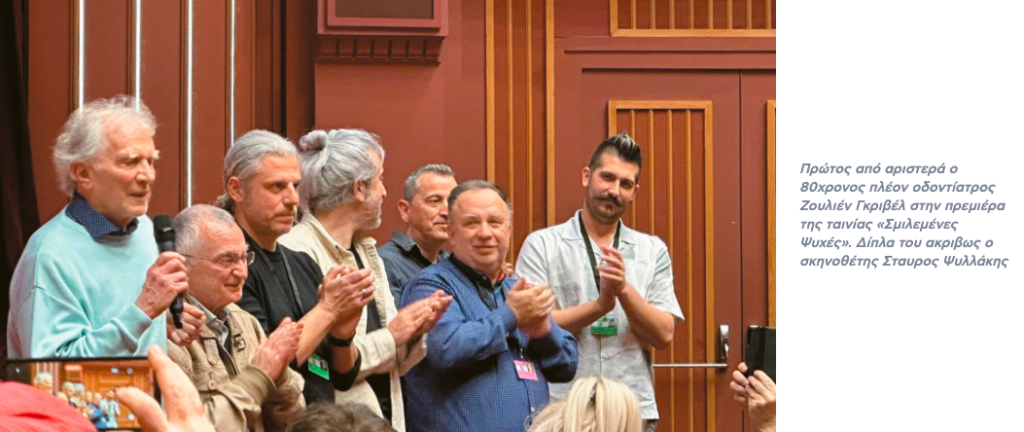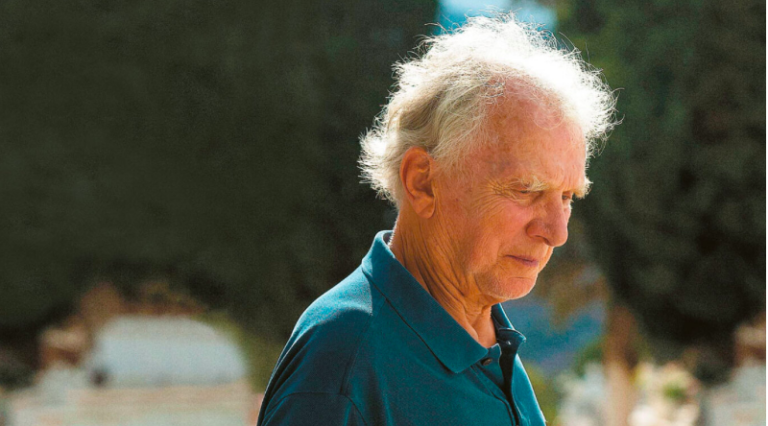Now 80 years old, Grivel’s remarkable journey is brought to the screen in “Sculpted Souls,” a documentary by acclaimed Greek filmmaker Stavros Psillakis, which premiered at the 27th Thessaloniki International Film Festival, earning three awards.
A Life of Service Turned Into Cinema
For decades, Grivel treated patients, many of whom had come from Spinalonga, the infamous leper colony in Crete. Over the years, his patients became his friends, teaching him everything about the disease and deepening his ties with the island. He became a local hero, a true Philhellene, whose story inspired Psillakis.
Moved by Grivel’s memoirs, the filmmaker set out to retrace his journey, capturing his work in hospitals and his deep connection with Crete. The result is a powerful message of hope, solidarity, and resilience—a tribute to a man who chose compassion over comfort.
A Standing Ovation at the Premiere
The documentary’s emotional premiere took place at the packed Olympion Cinema in Thessaloniki, with both Psillakis and Grivel himself in attendance. The Swiss dentist, who traveled to Greece for the event, captivated the audience with his heartfelt speech—delivered in fluent Greek—earning a standing ovation.
Two years after receiving the Honorary Golden Alexander, Psillakis returned to the festival, once again winning over audiences with a film that reaffirms what art is truly about—the human experience.
A Life-Changing Decision
Why would a Swiss dentist leave behind a comfortable life to work under such extreme conditions, treating leprosy patients without even wearing a mask—at a time when protective measures barely existed?

“Because he encountered the world of ‘difference,’” Psillakis explains. “He could have stayed in Switzerland, living a secure and predictable life. But life is movement. And for him, working with these patients was a lesson in courage—because they faced death every day.”
Yet, rather than fear and suffering, the documentary exudes optimism and humanity. Through personal diary entries, Grivel shares how his friendship with patients like Manolis Foundoulakis and Epameinondas Remoundakis, a legendary figure of Spinalonga, changed his life forever.
“My Own Ithaca”
Grivel’s journals became the foundation for his book, chronicling his work with Spinalonga’s survivors—most of whom were later relocated to Agia Varvara hospital in Athens. These outcasts of society taught him about stigma, isolation, and perseverance, turning his medical service into a lifelong mission.
His friendship with Manolis Foundoulakis, known as “Barba-Manolis,” is at the heart of the film. Foundoulakis, speaking from his home in Elounda, Crete, recalls a lifetime of exile, the hardships of leprosy, but also the strength and wisdom he gained through suffering.

Using rare archival footage, Psillakis intertwines history with humanity, capturing the essence of resilience. As Grivel himself reflects:
“With these people, I experienced moments of eternity. Profound and unforgettable.”
A True Philhellene
Beyond his medical work, Grivel embraced Greece in every way—learning the language, the culture, even the philosophy that shaped its identity.
“This country may have little water, but its light is inexhaustible,” he writes in his book, quoting Greek poet Giorgos Seferis.
His connection to Crete ran deep. He studied how leprosy patients lived, adopted their way of thinking, and even advocated on their behalf. It’s no surprise that the local community welcomed him as one of their own.

An Award-Winning Tribute
Grivel’s humanitarian work was recognized by the Academy of Athens, honoring him for his lifelong service.
“Giving enriches the giver,” he said in his acceptance speech, borrowing from Epicurean philosophy. “Life is a loan, a precious gift that does not belong to us. We must use it wisely and with respect, lest we lose it too soon.”
For Grivel, treating the teeth of leprosy patients for free was never an act of charity—it was an act of mutual respect.
His greatest reward, he says, was not financial. It was the love, trust, and gratitude of his patients.
“Some experiences cannot be measured in money. They can only be felt. And they stay with you forever.”
A Film That Sculpts the Soul
At its core, “Sculpted Souls” is a film about transformation—both of the patients and of Grivel himself.
Awarded the FIPRESCI Prize for Best Greek Feature Documentary, the ERT Prize, and the Youth Jury Award, the film resonated deeply with audiences—especially young viewers, often the toughest and most honest critics.
As Psillakis puts it:
“This film follows the sculpting of a man’s soul—shaped by his journey, his friendships, and his humanity.”
And that is the true legacy of a dentist who chose compassion over comfort—and found his own Ithaca along the way.
Ask me anything
Explore related questions





